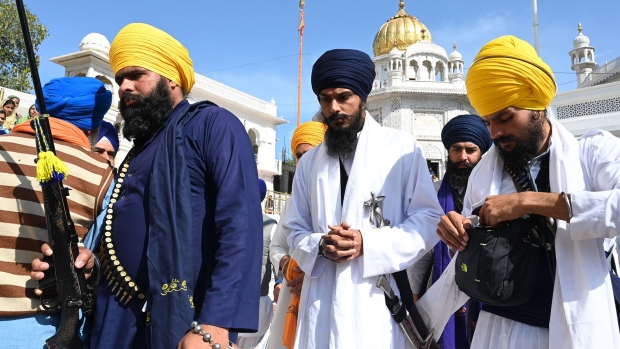Mar 22, 2023
How India’s Hunt for a Separatist Preacher Cut Off the Internet for 27 Million People
, Bloomberg News

(Bloomberg) -- Police in India’s border state of Punjab have been in pursuit of a fugitive Sikh separatist leader for several days — even cutting off mobile internet and text messaging services for the region’s more than 27 million people to prevent his supporters from gathering.
The self-styled preacher, Amritpal Singh, has called on his followers to revive a banned secessionist movement that fought to create an independent state called Khalistan for followers of the Sikh faith in Punjab in the 1980s and early 1990s.
While the separatist movement was largely wiped out in Punjab by the mid-90s, it continues to find some support within India and among the Sikh diaspora, especially in the UK, Australia and Canada.
Here is what we know about Amritpal Singh and the Khalistan movement right now:
What is the Khalistan movement?
The so-called Khalistan movement was the fight for an independent state for India’s Sikh population in the Punjab region. The violent secessionist movement paralyzed the state in the 1980s, leading to bombings, assassinations and thousands of deaths, including of police and civilians.
The main flash point came in 1984, when India’s army entered the Golden Temple in Amritsar and killed the leader of the insurgency, who had taken refuge in Sikhism’s holiest shrine. Months later, in an act of revenge, then-Prime Minister Indira Gandhi was shot and killed by two Sikhs who were part of her security detail; the assassination triggered bloody anti-Sikh riots in New Delhi.
By the mid-90s, a brutal security crackdown and factional infighting eroded the movement. However, it still has some support among the Sikh diaspora, especially in the UK, Australia and Canada.
Sikhs make up nearly 2% of India’s 1.4 billion population but are a majority in Punjab.
Who is Amritpal Singh?
The 30-year-old was working at a transport company in Dubai before he shot into the public eye about six months ago. Singh heads a group called “Waris Punjab De,” which in the Punjabi language means “the heirs of Punjab.”
His calls to revive the secessionist movement have drawn some parallels to Jarnail Singh Bhindranwale, who led the movement in the 1980s. However, unlike Bhindranwale, Singh doesn’t have the backing of the orthodox Sikh clergy.
“We all are still slaves. Those who think we are free should consult a doctor. We have to fight for freedom,” Singh said at a public gathering a few months ago. “Those who indulge in sacrilege will not be handed over to police or sent to courts, we will punish them.”
Why are police in Punjab looking to arrest Singh?
In February, Singh’s armed supporters stormed a police station demanding the release of an arrested aide. The incident was the latest in a string of criminal charges against Singh and his supporters. He’s also wanted for inciting violence. In several recent appearances, he has urged supporters to fight for an independent state and made assassination threats against government ministers.
He’s often seen surrounded by supporters armed with rifles and carrying belts of ammunition — styling himself along the lines of Bhindranwale.
Why were internet services suspended?
In Punjab, mobile internet and messaging services have been suspended in recent days to prevent incitement to violence. The Indian authorities often resort to internet shutdowns to stem protests. They’ve used this tactic during protests by farmers, nationwide demonstrations over a citizenship law and after it revoked the special autonomous status of Kashmir — the country’s only Muslim majority region.
In 2022, internet outages totaling 1,533 hours cost India $184 million, according to a report from the UK-based digital privacy and security research group Top10VPN.
How have supporters overseas responded?
In recent days, small groups of Singh’s supporters vandalized the Indian High Commission in London, pulling down the national flag and briefly flying the orange and blue flags of the Khalistan movement. A similar incident took place at the Indian consulate in San Francisco.
India’s federal government has said it’s maintaining a close watch on the activities of various activist groups at home and aboard. The Ministry of External Affairs has formally complained to the US and UK of inadequate security for its embassies. Meanwhile, security barricades were removed on Wednesday from the UK commission and high commissioner’s residence in New Delhi.
--With assistance from Rakesh Sharma.
(Updates with details about Singh)
©2023 Bloomberg L.P.





